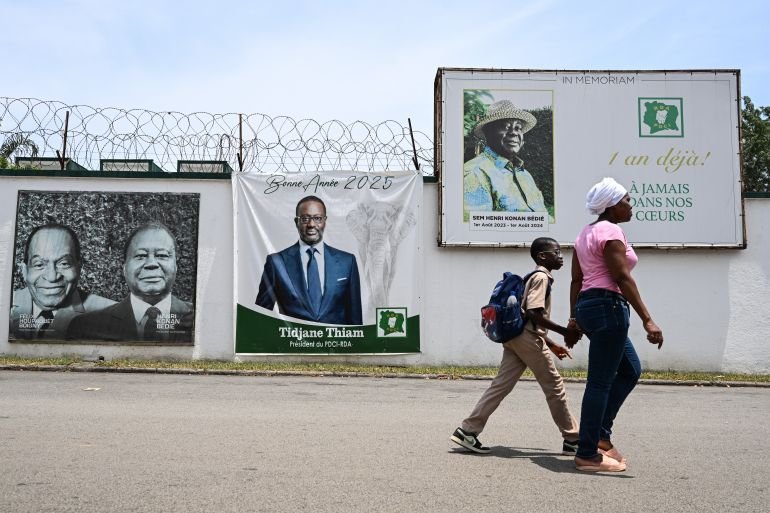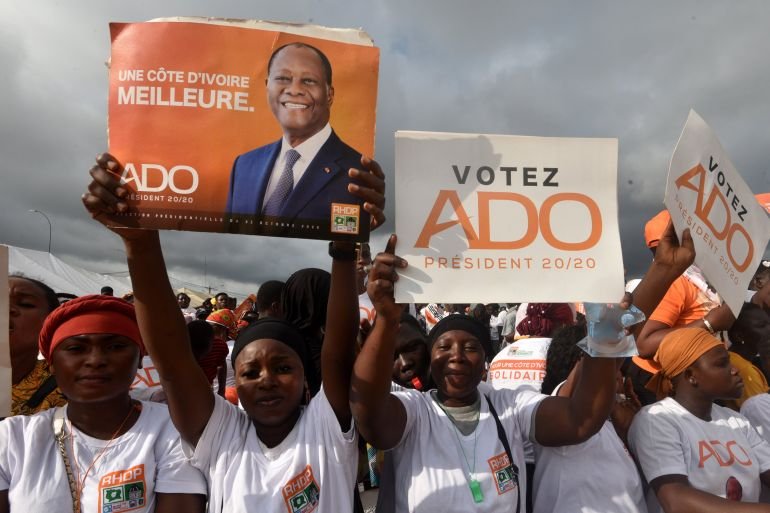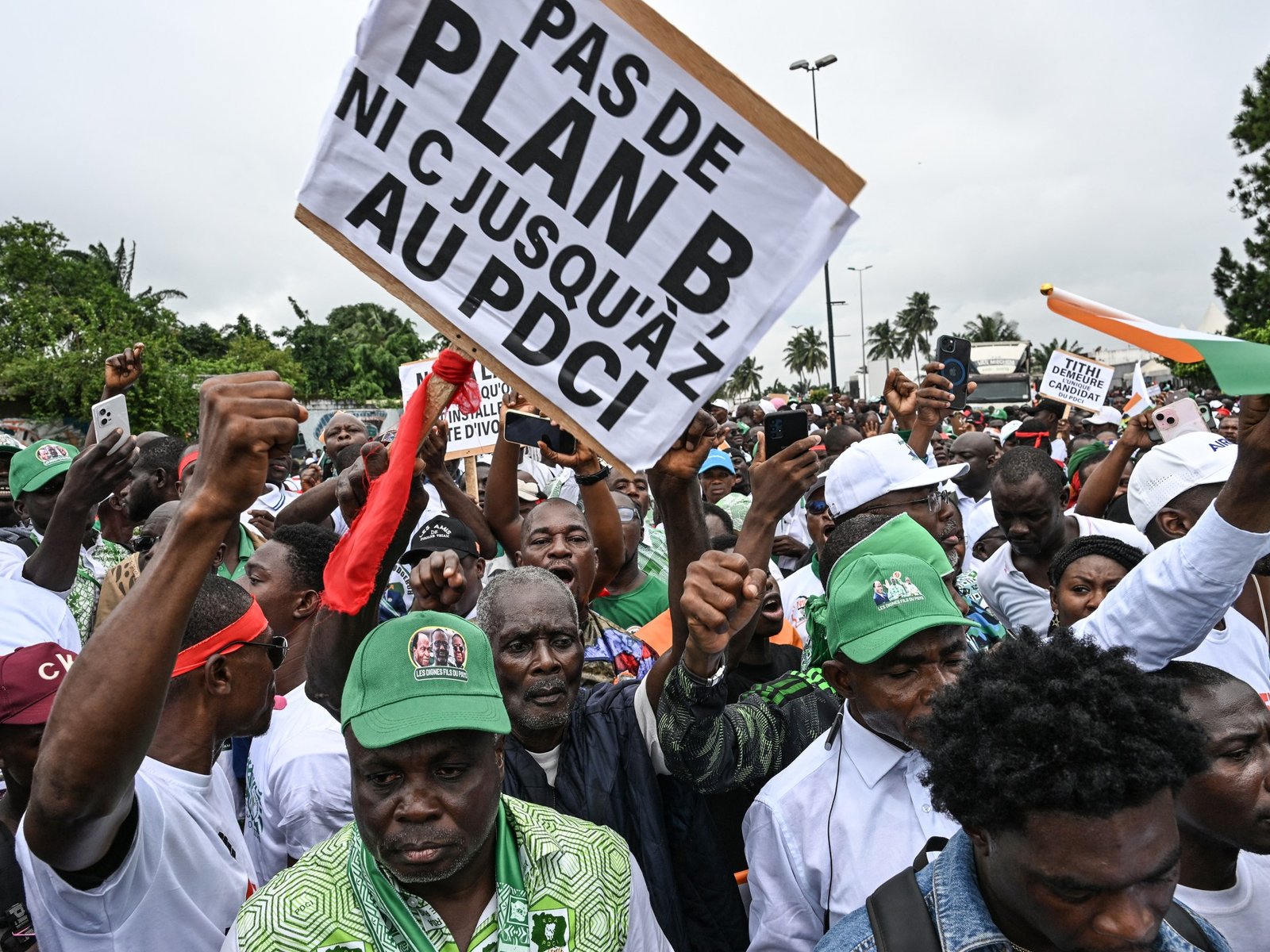In a dramatic display of political fervor, thousands of supporters for presidential hopeful Tidjane Thiam took to the streets of Abidjan, braving heavy rains and slick road conditions on Saturday. Their destination was the office of the Ivory Coast electoral commission.
Wearing the signature white and green colors of Thiam’s primary opposition party, the Democratic Party of Ivory Coast (PDCI), the crowd chanted “Thithi president!” in solidarity for a candidate who has recently been barred from participating in the elections. Among the sea of demonstrators, placards proclaiming “There’s no Plan B!” waved high alongside protest anthems.
“We denounce the arbitrary and unjust decision to disqualify President Thiam and other significant opposition figures,” declared Sylvestre Emmou, the PDCI’s executive secretary, as he was one of the few allowed to navigate past a substantial police barricade to file a grievance with the commission. “This situation is both unacceptable and a threat to peace and democracy in our nation,” he emphasized to his drenched supporters.
The protests underscore escalating tensions in West Africa’s second-largest economy ahead of the general elections in October 2025. Many citizens harbor fears of recurring violence reminiscent of the civil war triggered by the elections in 2011.
The stakes are high for the Ivory Coast, which is grappling with a regional security crisis, as incumbent President Alassane Ouattara gears up for a potential fourth term. This ambition has raised alarm among voters and political adversaries alike, especially in light of accusations surrounding a systemic effort by the government to exclude opposition figures.
Thiam, seen as Ouattara’s main competitor, was removed from the official candidate list on June 4, with the electoral commission citing his ineligibility due to a loss of Ivorian citizenship when he acquired French nationality in the 1980s.
Though Thiam renounced his French citizenship to reclaim his Ivorian one earlier this year, a court ruled in May that he didn’t qualify as Ivorian by the time he registered for the elections in 2022.
Supporters of Thiam accuse Ouattara, who has been in power since 2011, of orchestrating his disqualification to facilitate a smoother path to re-election. Previous elections saw the opposition boycott in 2020, claiming Ouattara had exceeded his term limit, leading to a relatively unchallenged victory for him. In 2015, Ouattara held a decisive lead.
Former President Laurent Gbagbo and his ally Charles Ble Goude have also been barred from eligibility due to past convictions related to the civil war. Similarly, ex-Prime Minister Guillaume Soro was excluded due to a fraud conviction.
Political analyst Sylvain N’Guessan from the University of Bondoukou remarked to Al Jazeera, “His legitimacy will be questioned if he runs without these four. He will come across as a candidate who had to eliminate credible opponents to secure his position. This raises serious concerns about his relationship with other political parties and the electorate.”

A ‘Fresh Perspective’ in Ivorian Politics
Many young Ivorians view Thiam, 62, as a refreshing alternative to the entrenched political elite, including the aging current president. His lineage traces back to Felix Houphouet-Boigny, the nation’s first prime minister. Thiam made history as the first Ivorian student accepted at Paris’s prestigious Ecole Polytechnique in 1982, which propelled him to prestigious roles in top firms such as McKinsey. After taking on a ministerial role upon returning to the Ivory Coast in 1994, his career was disrupted by a military coup in 1999.
Thiam later became the first African CEO of Swiss banking giant Credit Suisse but resigned in 2019 amid an espionage controversy from which he was ultimately cleared of wrongdoing. After a period abroad, he returned to the Ivory Coast and re-engaged with the PDCI.
His party advocates a revival of the economic renaissance associated with Houphouet-Boigny, which many recall as the “Ivorian Miracle” of rapid growth following colonialism. Thiam emphasizes inclusivity across ethnic and religious lines in his political vision.
“He embodies a new leadership style that could redefine governance in Côte d’Ivoire,” said N’Guessan, highlighting that the younger generation is weary of the longstanding political figures tied to past turmoil.
Though some critics question whether Thiam’s international experience makes him disconnected from local realities, he insists he enjoys significant grassroots support. During a BBC interview in April, Thiam accused the government of unfairly targeting him through a rarely enforced colonial-era law. He pointed to Ivorian-French footballers with dual citizenship as examples of the selective nature of the accusations against him. “I believe most Ivorians recognize this as a clear misuse of the legal system,” he asserted, asserting that broader issues affecting governance should take precedence in the elections rather than his citizenship status.
Al Jazeera attempted to reach the Ivorian government for comments but received no response before publication.

Moving Beyond Identity Politics
The day following Thiam’s rally, members of Ouattara’s ruling Rally of Houphouetists for Democracy and Peace (RHDP) convened in Yopougon, the most populous district of Abidjan.
Posters proclaiming “In Yopougon, our champion is ADO,” a nod to Ouattara’s initials, adorned the venue as senior party figures praised the president. This gathering served as a precursor to the party’s major congress on June 21-22, where Ouattara is expected to formally declare his candidacy.
“The only path forward is under President Alassane Ouattara,” proclaimed former Prime Minister Patrick Achi to the enthusiastic crowd.
At 83 years old, Ouattara has faced speculation about his ancestry and has historically been targeted by divisive identity politics, with opponents questioning his “Ivoirité” status, which led to his disqualification from previous elections. His winning of the 2011 elections sparked a protracted civil conflict after Gbagbo refused to concede power, resulting in thousands of fatalities.
Since then, Ouattara has amended the Ivorian constitution, allowing candidates with at least one Ivorian parent through a 2016 referendum. Under his stewardship, the country has rebounded from previous strife to experience an impressive economic resurgence, with an average annual growth rate of 7% over the last decade.
Ouattara secured electoral victory again in 2020, despite amidst opposition concerns that his third term was unconstitutional and arguments that his mandate had been reset under new constitutional provisions. Reports of violence marred that election cycle.
N’Guessan warns that the populace does not yearn for a return to the hardships of 2011 and cautions that prohibiting Thiam’s candidacy would dangerously revive identity politics. “We ought to address the issue of nationality with greater diligence,” he cautioned. “Repeated patterns lead to the same conflicts and societal ills.”

